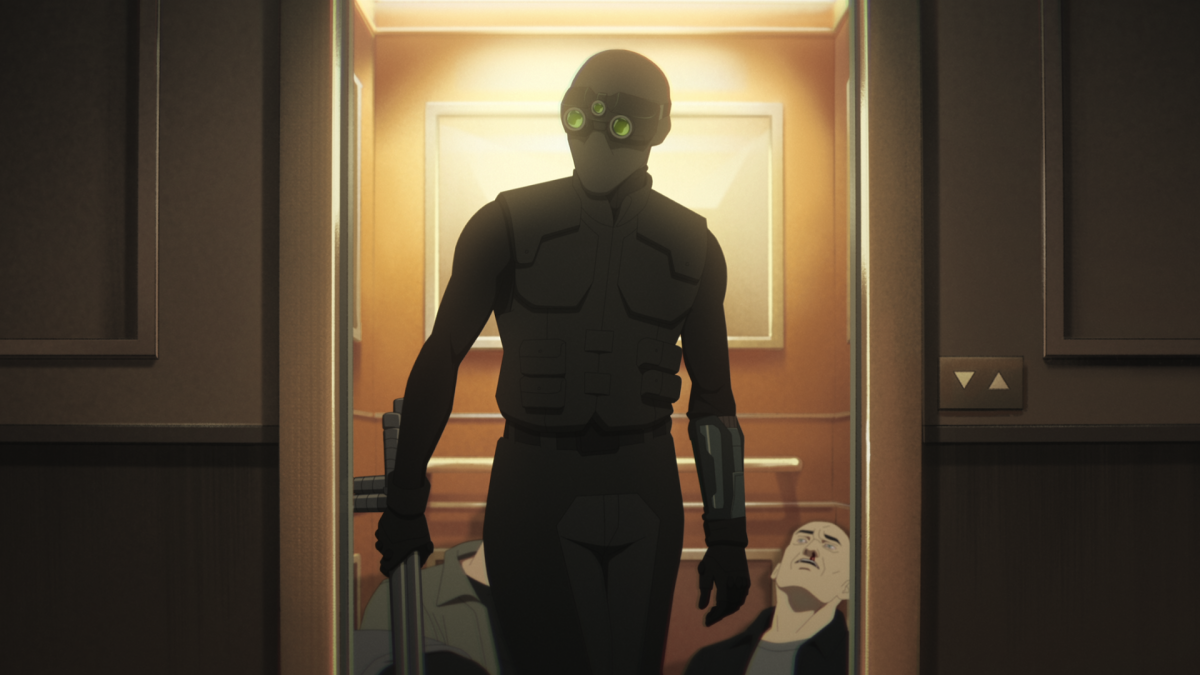John Wick Creator Derek Kolstad Brings Splinter Cell to Netflix
John Wick creator Derek Kolstad discusses his (night) vision for bringing a gaming classic to life on Netflix.

“Ironically or not, I’ve never really seen myself as the assassin guy,” Derek Kolstad, creator of the John Wick films and Netflix’s upcoming Splinter Cell series, admits. Instead, it all comes down to characters.
“One of the things that I like about Sam Fisher, John Wick, and Hutch Mansell [from Nobody] is that, yes, they’re pretty badass at what they do but, more importantly, they’re not the best. They get beat up.”
Splinter Cell: Deathwatch is set to premiere on Netflix in late 2025 and is based on the popular video game franchise Tom Clancy’s Splinter Cell by Ubisoft. The animated series has serious action pedigree behind it as it looks to continue the adventures of black ops legend Sam Fisher.
“I always loved the world of Splinter Cell. I’m a huge fan of army-of-one [stories] if you do it right,” Kolstad says. “And yet, even though he’s had hard decisions to make, it’s just refreshing that Sam Fisher’s a hero. He has moments of empathy and having to do this thing when both decisions are wrong, but one is a little less wrong at the cost of his soul and his own personal life, but for the benefit of the rest of us.”
Splinter Cell: Deathwatch opens with Sam Fisher enjoying a life of retirement after years dedicated to serving the United States as part of the elite clandestine unit, the Fourth Echelon. When Fisher is contacted by a younger colleague wounded and seeking his help, he is ready to put his special set of skills back to use and don his signature night-vision headset again to fight for the greater good. And, while Fisher may be a little rusty at first, he finds that being back in the field frees him from the ennui of his retired life, and he quickly falls back into lethally familiar rhythms.
“You have Sam in his retirement phase, hiding in plain sight with most of his enemies long gone. There is this contentment in the order that he’s built, and yet discontentment in his own various regrets and the haunting nature of a vet,” Kolstad says about Fisher’s stoic nature and ability to snap back into action. “There isn’t this ‘80s quippy, grinning, tongue-in-cheek to him. It’s the samurai notion of a soldier. You talk to special forces, with the best among them; when the action goes down, their blood pressure lowers, and their heart rate slows because that’s what they’ve been designed to be.”
Though Kolstad has made a name for himself writing plenty of no-nonsense lone wolf warriors, he finds himself more drawn to the wider world that the characters live in and the surprising amount of empathy even the most hardened killers possess. That feature certainly includes Sam Fisher and the world of Splinter Cell, something that will figure into Splinter Cell: Deathwatch.
That worldbuilding element will come into play as Fisher acclimates to changes involving the realpolitik of international relations since he was last actively working with the Fourth Echelon. Not only does this significantly affect the types of battles that Fisher finds himself embroiled in, but his own outlook on his past black ops service for the government.
“Here’s a guy who saw more than most but realized that he didn’t see everything,” Kolstad continues. “As things come to a head and he’s brought back in, the order has changed. Political enemies are now friends. Past friends are now enemies, and yet not, because you spilled blood and fought in the trenches together. It becomes something natural to him, and yet confusing.”
Of course, for all the worldbuilding and international intrigue of Splinter Cell: Deathwatch, Kolstad is clearly leaning into his storytelling strengths, with the show poised to have plenty of tautly executed action fans of the genre and franchise have come to expect. Sam Fisher isn’t looking to talk his way out of black ops missions and high-stakes skirmishes but put his finely honed talents to deadly use.
Kolstad sees Sam Fisher as the tip of the spear, increasingly aware of the moral complexities of what he does and who he works for but also able to identify who the real bad guys are as he returns to his usual operating grounds in the shadows. And in a steadily digital world, Sam Fisher is ready to prove that analog solutions are still the quickest and cleanest way to get a dirty deed done.
“That’s what I love about Sam,” notes Kolstad. “You look at the games, and he’s incredibly adept and comfortable at tech, but sometimes a bullet or a blade or the ripping out of some cord is your best line of defense.”
